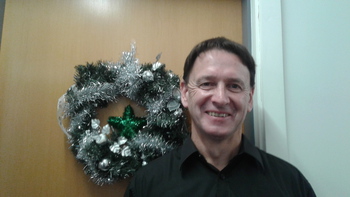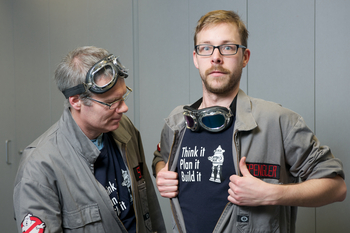News
Victoria University launches new cyber-security initiatives
03 May 2018 - 11:07 in Research
Staff from Victoria University of Wellington’s School of Engineering and Computer Science are in Samoa this month as part of an initiative to bring cyber-security education to the Pacific and beyond.
The group is installing 10 wireless network points to create a permanent wireless network at the National University of Samoa in Upolu, and will also advise on cyber-security.
“Having these units will open up new learning and teaching opportunities for the University,” Associate Professor Ian Welch says. But he says cyber-security education must be delivered alongside the initiative. “With their new high speed internet connection they are vulnerable to cyber-attacks, which could have devastating economic consequences.”
He and Matt Stevens, Teaching Fellow at the School of Engineering and Computer Science, will run workshops on cryptography—the process of securing online communications—and cyber-security for staff and students at the National University of Samoa.
A group led by School Manager Suzan Hall will also travel to schools in Samoa to teach students and teachers about digital technology. This initiative was first suggested by Assistant Vice-Chancellor (Pasifika) Hon. Luamanuvao Winnie Laban.
“This project will strengthen our relationship with the National University of Samoa,” says Hon. Luamanuvao Winnie Laban. “Along with the other initiatives and partnerships we have in the region, this cyber-security and digital education project is a wonderful opportunity for us to connect with our neighbours in the Pacific and play our part in helping our Pacific region to grow.”
Victoria University have also recently launched a 100-level paper in cyber-security—the first in New Zealand. This paper was developed in conjunction with CyberToa and other industry partners to fill what Associate Professor Welch refers to as a “huge skills-shortage”.
“We worked with industry to develop this paper to give students an understanding of the people, information, and processes behind cyber-security and train the people needed to fill jobs in the cyber-security industry,” says Associate Professor Welch. “We’re excited to see over 400 students studying engineering, information systems, and even a small group from law taking the paper this year, and we look forward to continuing to help our students gain these globally relevant skills.”
These two projects are part of ongoing international work and industry partnerships. Victoria University also offers cyber-security education in Fiji through its partnership with Wellington business CyberToa. Dale Carnegie, Dean of Victoria University’s School of Engineering, helped CyberToa connect with the University of the South Pacific, where they now teach four postgraduate courses.
Chris Ward, co-founder of CyberToa, says, “Our partnership with Victoria University helps us expand our business in the Pacific and improve cyber-security training in that area. In turn, Victoria University has access to some of our international connections.”
One of these international connections is with the Software Engineering Institute at Carnegie Mellon University, one of the world’s leading providers of cyber-security training. Victoria University drew on the expertise gained through this partnership to develop its 100-level paper, as well as working on several joint research projects with Carnegie Mellon.
“Through this partnership we have access to leading researchers, United States funding, and several exciting projects,” Associate Professor Welch says.
A year in reflection from Dean of Engineering, Professor Dale Carnegie
21 Dec 2017 - 12:45 in Achievement
Dean of Engineering, Professor Dale Carnegie, wraps up a busy 2017 and prepares for 2018…
It’s December already (or maybe–finally) and as everything starts to wind down, I’d like to reflect on the past year and look towards the future. It’s certainly been a busy and extremely productive year for the Faculty of Engineering. We have achieved an enormous amount.
First to mention is our tremendous rate of growth. We are New Zealand’s fastest-growing Engineering faculty and we have seen a significant increase in student numbers. I am proud that Victoria University is a place where new ICT/High-tech students want to study. The thing I enjoy most about being Dean of such a buzzing faculty is seeing the development of students who come to us straight from secondary school, and watching them flourish into well-equipped graduates ready for the real world and all kinds of exciting careers. I am also proud of our exemplary pastoral care programme which provides to support to students when they need it. Other highlights of the past year include the addition of the Robinson Research Institute into our Faculty and the announcement of the Computational Media Innovation Centre, which will soon grow to a team of 30 students and staff. On top of this we have been busy supporting exciting developments in our new Cybersecurity and Renewable Energy programmes. These programmes are unique in Australasia and further cement Victoria’s status as the place to study in 2018. We are also seeing the potential for growth in other areas, such as Artificial Intelligence and Robotics. We’ll meet regularly next year to discuss how best to progress these. None of our achievements would have been possible without the passion, expertise, drive and determination of all of our staff. I would like to personally thank everyone in the Faculty for contributing so much to our success, and congratulate those who have received awards for teaching and/or research, best paper prizes, or distinguished fellowships. There is no doubt our students are getting the best tuition possible, and at the cutting-edge of technology. After such a full on year, I encourage staff and students to take a well-deserved break over the festive season - and take the opportunity to regroup and refresh for the New Year. So again, thank you everyone. You have made the Faculty of Engineering a fantastic place to work and study. I look forward to seeing you all in the New Year.
It’s December already (or maybe–finally) and as everything starts to wind down, I’d like to reflect on the past year and look towards the future. It’s certainly been a busy and extremely productive year for the Faculty of Engineering. We have achieved an enormous amount.
First to mention is our tremendous rate of growth. We are New Zealand’s fastest-growing Engineering faculty and we have seen a significant increase in student numbers. I am proud that Victoria University is a place where new ICT/High-tech students want to study. The thing I enjoy most about being Dean of such a buzzing faculty is seeing the development of students who come to us straight from secondary school, and watching them flourish into well-equipped graduates ready for the real world and all kinds of exciting careers. I am also proud of our exemplary pastoral care programme which provides to support to students when they need it. Other highlights of the past year include the addition of the Robinson Research Institute into our Faculty and the announcement of the Computational Media Innovation Centre, which will soon grow to a team of 30 students and staff. On top of this we have been busy supporting exciting developments in our new Cybersecurity and Renewable Energy programmes. These programmes are unique in Australasia and further cement Victoria’s status as the place to study in 2018. We are also seeing the potential for growth in other areas, such as Artificial Intelligence and Robotics. We’ll meet regularly next year to discuss how best to progress these. None of our achievements would have been possible without the passion, expertise, drive and determination of all of our staff. I would like to personally thank everyone in the Faculty for contributing so much to our success, and congratulate those who have received awards for teaching and/or research, best paper prizes, or distinguished fellowships. There is no doubt our students are getting the best tuition possible, and at the cutting-edge of technology. After such a full on year, I encourage staff and students to take a well-deserved break over the festive season - and take the opportunity to regroup and refresh for the New Year. So again, thank you everyone. You have made the Faculty of Engineering a fantastic place to work and study. I look forward to seeing you all in the New Year.
Postdoctoral Research Fellow: Introducing Adrian Pekar to ECS
21 Dec 2017 - 08:52 in Achievement
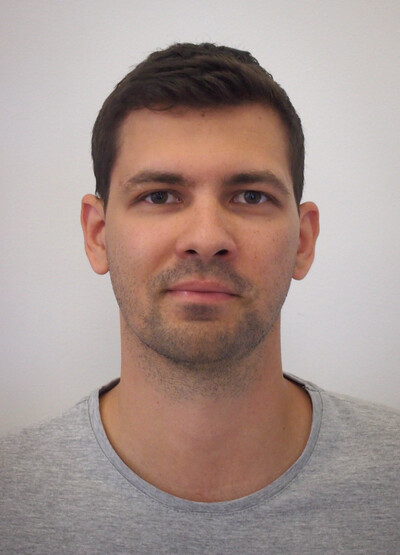 Name? Adrian Pekar.
Born in? Kralovsky Chlmec, Slovakia.
Lived in? Slovakia, Hungary, Austria, New Zealand.
First job? Data Centre and Network Function Virtualization Engineer.
Position at VUW? Postdoctoral Research Fellow.
Key research interests? Network Traffic Classification, Management and Engineering, QoS, IPFIX/NetFlow, Software Defined Networking, Data Centre and Network Function Virtualization.
Most looking forward to at VUW? To give and to receive! That is, to share my expertise and knowledge while developing my career.
Where can people find you at VUW? AM407.
Why Wellington? See the quote to live by below!
Favourite movie? The Secret Life of Walter Mitty.
Favourite food? Cabbage soup (Slovak: kapustnica).
Quote to live by? “I rarely end up where I was intending to go, but often I end up somewhere I needed to be” (Douglas Adams).
Name? Adrian Pekar.
Born in? Kralovsky Chlmec, Slovakia.
Lived in? Slovakia, Hungary, Austria, New Zealand.
First job? Data Centre and Network Function Virtualization Engineer.
Position at VUW? Postdoctoral Research Fellow.
Key research interests? Network Traffic Classification, Management and Engineering, QoS, IPFIX/NetFlow, Software Defined Networking, Data Centre and Network Function Virtualization.
Most looking forward to at VUW? To give and to receive! That is, to share my expertise and knowledge while developing my career.
Where can people find you at VUW? AM407.
Why Wellington? See the quote to live by below!
Favourite movie? The Secret Life of Walter Mitty.
Favourite food? Cabbage soup (Slovak: kapustnica).
Quote to live by? “I rarely end up where I was intending to go, but often I end up somewhere I needed to be” (Douglas Adams).
Postdoctoral Research Fellow: Anuroop Gaddam
20 Dec 2017 - 09:26 in Research
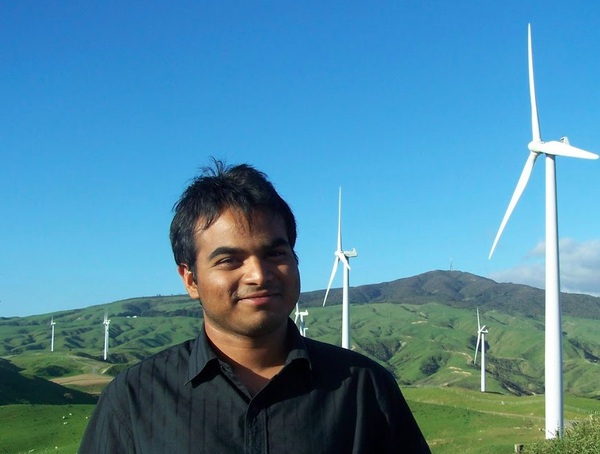 Born in? India.
Born in? India.Lived in? I lived in Hyderabad, India, before moving to New Zealand in 2006. Since then I have lived in Palmerston North, Auckland and Hamilton. First job? My first job was straight after finishing my PhD. I worked as a lecturer of Electronics Engineering at the Centre for Engineering and Industrial Design at the Waikato Institute of Technology in Hamilton. Key research interests? I have broad interests within Smart Sensors, Wireless Sensor Networks, Internet of Things, Activity detection and wellness pattern generation using ad hoc Wireless Sensor Networks, e-Learning - and last but not least - educational game development. Why Wellington? Wellington is a great place to live and work, with amazing scenery. When did you begin at Vic? I started as a Postdoctoral Research Fellow in June 2017. Where can people find you at VUW? EA 107. Who have you been working with? I am working with Dr Karsten Lundqvist as a member of the e-Learning Research Group within the School of Engineering and Computer Science. What have you been working on? Creating tools to improve teaching and learning within various cultural settings, including the use of games and gaming methods in education, and especially for engaging Maori/Pasifika students in Computer Science learning. What have you enjoyed the most so far? Developing culturally-relevant games for Māori/Pasifika students who are still in school. This is because creativity is the foundation of what we do - and it is what makes creating games so exciting. Other than that, a highlight for me has been learning to speak and use Te Reo Māori for research purposes. What are some of the challenges you have faced? Coming from an Electronics Engineering background, taking up a role in Computer Science was initially a challenge – but surprisingly, what I have learnt is that when you are motivated and push yourself to try something difficult, it becomes a passion rather than a challenge. What are you looking forward to in the future? I am looking forward to using the latest technology alongside cultural diversity to advance teaching and learning. I would also like to build on my existing skills and continue my involvement in many professional associations.
Farewelling Elf Eldridge
19 Dec 2017 - 11:03 in Achievement
After years of outstanding service, Victoria’s School of Engineering and Computer Science (ECS) is sad to be farewelling one of its most well-loved lecturers.
In his time at ECS, Elf Eldridge has amassed an enthusiastic following comprising the students he has taught and nurtured since their first year, as well as being popular with his colleagues.
Elf first joined the School while finishing his PhD in Physics to take up a role in the outreach and pastoral care team. He was instrumental in inspiring high school students to study at ECS, then providing academic support for them when they arrived at university.
In 2015 Elf joined the permanent academic staff as a lecturer, with a unique vision for first-year engineering courses. Since early 2017 he has also served as the first-year programme director.
Elf says his favourite thing about working at ECS has always been students who have an appetite for knowledge, be it for games, programming, videos, machine learning, hacking, robotics—anything!
“First-years, in particular, are just as excited by new technology as I am. While they have a range of abilities, the common thing about them is that they are genuinely interested in learning new things and finding clever solutions to the problems they encounter.”
Elf also says the Faculty’s good sense of humour creates a unique learning environment.
“The students are comfortable enough to ask for help if they need it, but also to laugh it off if they or I make a mistake.” Head of School Dr Stuart Marshall says Elf will be sorely missed. “It is regrettably time to say goodbye to an extremely valued member of our School community,” says Dr Marshall. “Elf has been an outstanding and engaging colleague and has contributed highly to our School culture, never afraid to put forward ideas and suggestions for improvement.” Elf’s ‘Lecturer of the Year’ award from the Victoria University of Wellington Students' Association (VUWSA) in 2016 is also a testament to his commitment to his students and inspiring teaching style, says Dr Marshall. “Elf won this award for his hard work, dedication and engagement with students, and he is incredibly well-liked by students and staff alike. We wish Elf all the best for the future and reflect on the times we have shared with him.” Elf also has a busy 2018 planned. He hopes to spend time at the beach, perform in a circus show and tramp in the Andes. He also intends to keep running robotics outreach events and public science outreach. “That should be enough to keep me busy for the short term!”
Elf also says the Faculty’s good sense of humour creates a unique learning environment.
“The students are comfortable enough to ask for help if they need it, but also to laugh it off if they or I make a mistake.” Head of School Dr Stuart Marshall says Elf will be sorely missed. “It is regrettably time to say goodbye to an extremely valued member of our School community,” says Dr Marshall. “Elf has been an outstanding and engaging colleague and has contributed highly to our School culture, never afraid to put forward ideas and suggestions for improvement.” Elf’s ‘Lecturer of the Year’ award from the Victoria University of Wellington Students' Association (VUWSA) in 2016 is also a testament to his commitment to his students and inspiring teaching style, says Dr Marshall. “Elf won this award for his hard work, dedication and engagement with students, and he is incredibly well-liked by students and staff alike. We wish Elf all the best for the future and reflect on the times we have shared with him.” Elf also has a busy 2018 planned. He hopes to spend time at the beach, perform in a circus show and tramp in the Andes. He also intends to keep running robotics outreach events and public science outreach. “That should be enough to keep me busy for the short term!”
A taste of future robotics
14 Dec 2017 - 09:01 in Research
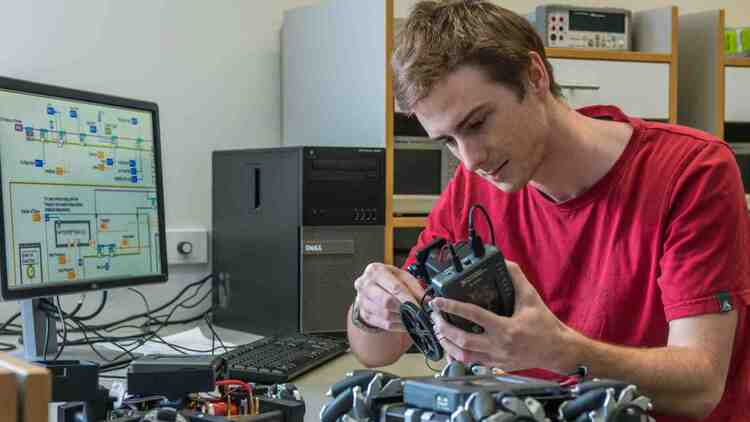 Did you know that robots can now ‘taste’ as humans do? We do now, thanks to Victoria Honours student Michael Pearson.
Michael’s ENGR 489 project gave robots the ability to mimic a human’s inquisitive nature—a nature which normally enables us to recognise objects much better than artificial systems can.
Robots are an increasingly prevalent part of our society, but they struggle to achieve some tasks which are trivial to humans, says Michael.
“Anecdotally, humans don’t just use vision to recognise objects, so why should robots?” says Michael. “My project explored how we can add more senses to a robot to improve its ability to recognise those objects too.”
In the project, which included machine learning, networking and electronics, Michael created a multi-sensory robot using a low-cost spectrometer to allow basic recognition of objects, such as a cricket ball compared to a nectarine.
Mimicking a human’s sense of taste in this way could be described as using a crude approximation of an artificial ‘mouth’, says Michael.
“When humans taste food we immediately get a sensation of how sweet, sour or perhaps bitter it is. The sensor used in this project is able to crudely detect molecules just like a human's tongue. From this information the sensor can then make a prediction as to what has been scanned.”
This classification system has varied uses, including in the self-checkout aisle of supermarkets if a customer were to weigh and scan other items to receive a cheaper price than their actual product. Michael’s robot can tell a carrot from a cucumber, for example.
Did you know that robots can now ‘taste’ as humans do? We do now, thanks to Victoria Honours student Michael Pearson.
Michael’s ENGR 489 project gave robots the ability to mimic a human’s inquisitive nature—a nature which normally enables us to recognise objects much better than artificial systems can.
Robots are an increasingly prevalent part of our society, but they struggle to achieve some tasks which are trivial to humans, says Michael.
“Anecdotally, humans don’t just use vision to recognise objects, so why should robots?” says Michael. “My project explored how we can add more senses to a robot to improve its ability to recognise those objects too.”
In the project, which included machine learning, networking and electronics, Michael created a multi-sensory robot using a low-cost spectrometer to allow basic recognition of objects, such as a cricket ball compared to a nectarine.
Mimicking a human’s sense of taste in this way could be described as using a crude approximation of an artificial ‘mouth’, says Michael.
“When humans taste food we immediately get a sensation of how sweet, sour or perhaps bitter it is. The sensor used in this project is able to crudely detect molecules just like a human's tongue. From this information the sensor can then make a prediction as to what has been scanned.”
This classification system has varied uses, including in the self-checkout aisle of supermarkets if a customer were to weigh and scan other items to receive a cheaper price than their actual product. Michael’s robot can tell a carrot from a cucumber, for example.The end goal of the project was to improve the accuracy of existing classification systems, says Michael. He used a lot of the knowledge he gained studying at Victoria, especially his 400-level Artificial Intelligence papers, which gave him the understanding of the algorithms necessary for the project. However, it turned out to be a challenge. “Often there was a lot of learning required before progress could be made.”
The facilities provided by the University were also invaluable, from the software Michael used while studying, to the hardware to run his experiments. He also has some advice for future students: “Make sure you don’t forget to document all of the small decisions that seem obvious to you. Every aspect of your project is important—and the more you can communicate what you did, the happier you’ll be with your final report.” Being in Wellington also means Michael is close to several high-profile technology companies, including TradeMe and Xero, which could now feature in his future. “I’d love to work on embedded systems, with some aspect of machine learning,” he says. “This project has given me so many skills that I hope to use in my future, both personally and professionally.”
Senior Lecturer: Introducing Alvin Valera to ECS
12 Dec 2017 - 09:24 in Research
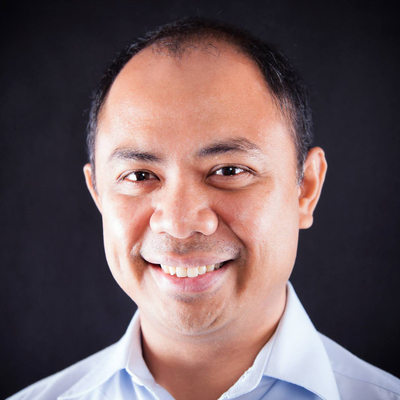 Name? Alvin Valera.
Born in? The Philippines.
Lived in? First 24 years in the Philippines and the rest (up until November) in Singapore.
Position at VUW? Senior Lecturer.
Key research interests? Internet of Things (IoT), wireless ad hoc and sensor networks.
Most looking forward to at VUW? Working with students to design and build novel IoT systems.
Where can people find you at VUW? AM 401.
Why Wellington? When I visited Wellington two years back, I was mesmerised by its beautiful harbour.
Favourite movie? Star Wars (Return of the Jedi).
Favourite music? Sailing by Christopher Cross
Favourite food? Lechon - Philippine-style roast pork.
Quote to live by? “A person who never made a mistake never tried anything new.”
Name? Alvin Valera.
Born in? The Philippines.
Lived in? First 24 years in the Philippines and the rest (up until November) in Singapore.
Position at VUW? Senior Lecturer.
Key research interests? Internet of Things (IoT), wireless ad hoc and sensor networks.
Most looking forward to at VUW? Working with students to design and build novel IoT systems.
Where can people find you at VUW? AM 401.
Why Wellington? When I visited Wellington two years back, I was mesmerised by its beautiful harbour.
Favourite movie? Star Wars (Return of the Jedi).
Favourite music? Sailing by Christopher Cross
Favourite food? Lechon - Philippine-style roast pork.
Quote to live by? “A person who never made a mistake never tried anything new.”
Student’s smoking hot idea adds fire to DJ scene
07 Dec 2017 - 09:06 in Research
 A Computer Graphics student has created a fully interactive tool for DJs and artists where a digital smoke simulation reacts to music in real-time.
Jack Purvis’s Honours project looked at the challenge of simulating smoke using computer graphics techniques, and how the effect can be influenced by a dynamic input like music to create an appealing visualisation.
Jack came up with the project himself, combining his passions for computer graphics and music.
“I had built music visualisers in the past, but I wanted a deeper understanding of how audio processing works,” explains Jack. “I designed a program which reads audio from an input device, allowing a livestream of music to be visualised.”
Jack also wanted to learn more about the computer graphics techniques that enable smoke simulation. Fluid dynamics and its associated mathematics can be used to simulate the physical properties of real-world fluids. As smoke is often used as a practical effect in live performances it served as a good candidate for application in a music visualisation.
Properties of music such as the volume level, beats and frequency information can be used to influence the smoke effect to produce a visualisation. The smoke simulation implementation is based on the Navier-Stokes equations, which describe the motion of fluids—like smoke—over time.
“Implementing the smoke simulation showed that I can use my passions to motivate myself to solving a complex engineering problem,” says Jack. “People really enjoyed watching the visualisation, so I received a lot of positive feedback on the final output.”
The tool is ideal for use on screens in clubs or at gigs, or to create music videos.
Jack’s supervisor, Professor Neil Dodgson, helped him design the project and supported him along the way with tips on mathematics, as well as presentation and technical writing skills.
Jack also credits his university courses with providing him with the skills to complete the project, not least the ability to self-manage and implement a large project independently.
“From the Computer Science and Engineering side, I learnt how to solve complex problems by breaking them down into smaller, logical steps,” he says. “From the Design side, I was able to apply my design thinking to create an appealing visual effect that engages the audience.”
Jack’s dream job would to be to combine his skills in computer science and design to build audio-visual experiences for live performance or exhibitions. For now he loves living in Wellington and being a Victoria student where he is exposed to new fields of research and connections with the industry.
“Victoria has many leading researchers who are exploring exciting new technologies,” Jack says. “If you are passionate about a certain topic you can propose your own project idea. A project that is tailored to your own interests is highly motivating and can lead to a highly successful Honours year.”
A Computer Graphics student has created a fully interactive tool for DJs and artists where a digital smoke simulation reacts to music in real-time.
Jack Purvis’s Honours project looked at the challenge of simulating smoke using computer graphics techniques, and how the effect can be influenced by a dynamic input like music to create an appealing visualisation.
Jack came up with the project himself, combining his passions for computer graphics and music.
“I had built music visualisers in the past, but I wanted a deeper understanding of how audio processing works,” explains Jack. “I designed a program which reads audio from an input device, allowing a livestream of music to be visualised.”
Jack also wanted to learn more about the computer graphics techniques that enable smoke simulation. Fluid dynamics and its associated mathematics can be used to simulate the physical properties of real-world fluids. As smoke is often used as a practical effect in live performances it served as a good candidate for application in a music visualisation.
Properties of music such as the volume level, beats and frequency information can be used to influence the smoke effect to produce a visualisation. The smoke simulation implementation is based on the Navier-Stokes equations, which describe the motion of fluids—like smoke—over time.
“Implementing the smoke simulation showed that I can use my passions to motivate myself to solving a complex engineering problem,” says Jack. “People really enjoyed watching the visualisation, so I received a lot of positive feedback on the final output.”
The tool is ideal for use on screens in clubs or at gigs, or to create music videos.
Jack’s supervisor, Professor Neil Dodgson, helped him design the project and supported him along the way with tips on mathematics, as well as presentation and technical writing skills.
Jack also credits his university courses with providing him with the skills to complete the project, not least the ability to self-manage and implement a large project independently.
“From the Computer Science and Engineering side, I learnt how to solve complex problems by breaking them down into smaller, logical steps,” he says. “From the Design side, I was able to apply my design thinking to create an appealing visual effect that engages the audience.”
Jack’s dream job would to be to combine his skills in computer science and design to build audio-visual experiences for live performance or exhibitions. For now he loves living in Wellington and being a Victoria student where he is exposed to new fields of research and connections with the industry.
“Victoria has many leading researchers who are exploring exciting new technologies,” Jack says. “If you are passionate about a certain topic you can propose your own project idea. A project that is tailored to your own interests is highly motivating and can lead to a highly successful Honours year.”
Teaching Fellow: Introducing Saeed Mirghasemi to ECS
05 Dec 2017 - 10:01 in Research
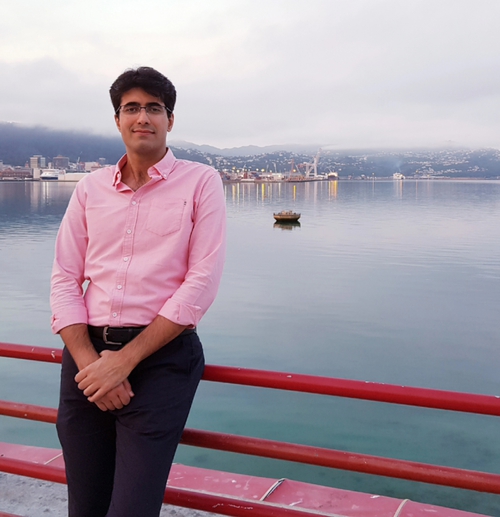 Name? Saeed Mirghasemi.
Born in? Tehran, Iran.
Lived in? Iran and NZ.
First job? Electronic designer.
Position at VUW? Teaching Fellow.
Key research interests? Computer vision - Data analysis.
Most looking forward to at VUW? Teaching a lot and learning a lot.
Where can people find you at VUW? My office! EA 108.
Why Wellington? It was an accident, but I am glad I ended up here.
Favourite movie? There is no such a thing as a single favourite movie, but I like Fight Club very much.
Favourite music? Persian traditional. Get a glimpse of it: https://www.youtube.com/watch?v=c9zy_eureGs
Favourite food? Mirza Ghasemi. See the recipe: https://www.youtube.com/watch?v=XQzx0XLr2ps
Affirmation to live by? “Education is the most powerful weapon which you can use to change the world” (Nelson Mandela).
Name? Saeed Mirghasemi.
Born in? Tehran, Iran.
Lived in? Iran and NZ.
First job? Electronic designer.
Position at VUW? Teaching Fellow.
Key research interests? Computer vision - Data analysis.
Most looking forward to at VUW? Teaching a lot and learning a lot.
Where can people find you at VUW? My office! EA 108.
Why Wellington? It was an accident, but I am glad I ended up here.
Favourite movie? There is no such a thing as a single favourite movie, but I like Fight Club very much.
Favourite music? Persian traditional. Get a glimpse of it: https://www.youtube.com/watch?v=c9zy_eureGs
Favourite food? Mirza Ghasemi. See the recipe: https://www.youtube.com/watch?v=XQzx0XLr2ps
Affirmation to live by? “Education is the most powerful weapon which you can use to change the world” (Nelson Mandela).
Learning to programme: To touch or not to touch?
30 Nov 2017 - 09:43 in Research
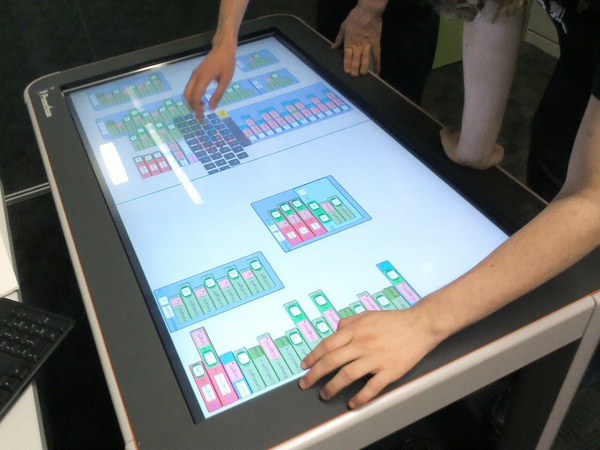 A Computer Science student has explored the potential of using interactive touch tables to teach programming compared to traditional mouse and keyboard versions, fulfilling a long-held aspiration to investigate how people learn best.
Master’s student Ben Selwyn-Smith, who cites a keen interest in education, found that the benefits of the new approach include the ability for multiple users to code at the same time, something which was previously impossible.
For these purposes, a visual, block-based programming language called Tabletop Grace was used, an extension from an existing mouse and keyboard block language called Tiled Grace. Block-based languages, including one called Scratch, have previously been used to teach children how to code, as they provide an easy way to create games and animations with no syntax errors.
“The main motivation behind this project was to combine block-based programming with pair programming, where two people can code at the same time, and also with interactive touch tables,” explains Ben. “Research has shown that each of these is individually worthwhile, but combinations of all three did not exist.”
Previously, pair programming with block languages was typically done either with two individuals sharing one single-user device, or two devices with remote collaboration, whereas using an interactive touch table allows users to collaborate from the same location.
“This project is great in that I got to combine software development and design with research, including experience in conducting that research, formal presentations and software demonstrations,” Ben continues. “I now feel much more prepared for future endeavours—if I decide to pursue a career in programming or research I have a good grounding in both.”
Ben also enjoyed working with his two supervisors from Victoria’s School of Engineering and Computer Science: Dr Craig Anslow, with his extensive knowledge of interactive touch tables, and Dr Michael Homer, the creator of Tiled Grace, the block-based language that formed the basis of Ben’s new software, Tabletop Grace.
“Getting to work alongside my supervisors was great, as well as being a collaborator on a paper that was accepted by the Blocks and Beyond 2017 Workshop,” says Ben. “Tabletop Grace was considered to be as usable as Tiled Grace, so the transition to touch tables was successful. Also, 70 percent of participants in my user study said they preferred working on the tabletop, as it was less frustrating and more enjoyable, intuitive and novel.”
Ben credits Victoria’s 24-hour access computer labs with keeping him on task during the project.
“The coolest thing about being an student at Victoria is that if I feel like coming in and doing some work at 4am, I can!” he says. “Also living in Wellington, everything I need is within easy walking distance, which keeps me healthy despite long hours working at a computer.”
“As I did a second major in Japanese at undergraduate level, my dream job would be somewhere where I can combine my language skills with computer science, either here or in Japan.”
A Computer Science student has explored the potential of using interactive touch tables to teach programming compared to traditional mouse and keyboard versions, fulfilling a long-held aspiration to investigate how people learn best.
Master’s student Ben Selwyn-Smith, who cites a keen interest in education, found that the benefits of the new approach include the ability for multiple users to code at the same time, something which was previously impossible.
For these purposes, a visual, block-based programming language called Tabletop Grace was used, an extension from an existing mouse and keyboard block language called Tiled Grace. Block-based languages, including one called Scratch, have previously been used to teach children how to code, as they provide an easy way to create games and animations with no syntax errors.
“The main motivation behind this project was to combine block-based programming with pair programming, where two people can code at the same time, and also with interactive touch tables,” explains Ben. “Research has shown that each of these is individually worthwhile, but combinations of all three did not exist.”
Previously, pair programming with block languages was typically done either with two individuals sharing one single-user device, or two devices with remote collaboration, whereas using an interactive touch table allows users to collaborate from the same location.
“This project is great in that I got to combine software development and design with research, including experience in conducting that research, formal presentations and software demonstrations,” Ben continues. “I now feel much more prepared for future endeavours—if I decide to pursue a career in programming or research I have a good grounding in both.”
Ben also enjoyed working with his two supervisors from Victoria’s School of Engineering and Computer Science: Dr Craig Anslow, with his extensive knowledge of interactive touch tables, and Dr Michael Homer, the creator of Tiled Grace, the block-based language that formed the basis of Ben’s new software, Tabletop Grace.
“Getting to work alongside my supervisors was great, as well as being a collaborator on a paper that was accepted by the Blocks and Beyond 2017 Workshop,” says Ben. “Tabletop Grace was considered to be as usable as Tiled Grace, so the transition to touch tables was successful. Also, 70 percent of participants in my user study said they preferred working on the tabletop, as it was less frustrating and more enjoyable, intuitive and novel.”
Ben credits Victoria’s 24-hour access computer labs with keeping him on task during the project.
“The coolest thing about being an student at Victoria is that if I feel like coming in and doing some work at 4am, I can!” he says. “Also living in Wellington, everything I need is within easy walking distance, which keeps me healthy despite long hours working at a computer.”
“As I did a second major in Japanese at undergraduate level, my dream job would be somewhere where I can combine my language skills with computer science, either here or in Japan.”

